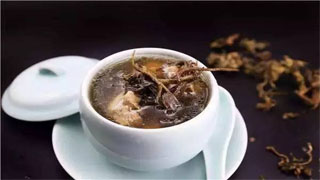
The Great Treatise on the Four Qi Regulating Spirits in the Yellow Emperor's Inner Canon states: "In the third month of autumn, one should lie down early and wake up early to be invigorated by the rooster. This will bring peace to one's mind, slow down the punishment of autumn, restrain one's energy, make autumn qi calm, eliminate external desires, and clear the lung qi." Autumn is suitable for going to bed early and waking up early, following the law of the growth and decline of yang qi, and maintaining the body's yang qi. The autumn wind is fierce, which can easily lead to the feeling of "autumn sadness". It is particularly important to pay attention to regulating emotions and maintain an optimistic and open-minded attitude. Going out together during holidays is also a good way to adjust. In addition, the dry weather and dry matter are not very friendly to patients with chronic cough and asthma such as bronchiectasis. Below is a dietary formula for clearing the lungs and moistening dryness - Wu Juice Soup, which can moisten the lungs, generate fluids, nourish yin and clear dryness during this season.
【 Composition of Soup Formula 】
20 grams of reed roots, 30 water chestnuts, 50 grams of Ophiopogon japonicus, 4 pears, and 1 section of lotus root
Wash, peel and cut the lotus root slices according to the above ratio, wash and cut the water chestnuts into pieces, wash the reed roots and soak them in water for 30 minutes, wash and peel the pears and cut them into sections. Put all the ingredients into the pot, add water that has not been used for the ingredients, bring to a boil over high heat, then simmer over low heat for 2 hours.
Analysis of Soup Formula
Reed roots have a sweet taste and a cold nature. Return to the lung meridian and stomach meridian. It has the effects of clearing heat and generating fluids, relieving irritability, stopping nausea, and diuresis.
Water chestnuts have a sweet taste, a mild nature, and can be found in the lungs and stomach meridians. They have the effects of clearing heat, quenching thirst, promoting dampness, resolving phlegm, cooling blood, and detoxifying.
Ophiopogon japonicus has the effects of nourishing yin and generating fluids, moistening the lungs and clearing the heart, nourishing the stomach and generating fluids, clearing the heart and eliminating annoyance, moistening the intestines and promoting bowel movements. It can also enhance the body's immunity: it has an inhibitory effect on various bacteria.
Autumn pears have a sweet and sour taste, a cold and refreshing nature, and have the effects of generating saliva, moistening the lungs, and stopping cough. It can also alleviate respiratory diseases such as cough and asthma.
Lotus root can relieve irritability and thirst, nourish yin and strengthen the body, promote bowel movements, stop diarrhea and lose weight. It also contains various nutrients such as protein and vitamin C, which can cool blood, disperse stasis, nourish the heart and stomach, and have the effect of nourishing yin and blood. It can be used to supplement the deficiency of the five organs and strengthen the muscles and bones.
【 Health benefits 】
Wu Zhi Tang comes from the famous warm disease expert Wu Jutong's "Wen Bing Tiao Bian" in the Qing Dynasty. It is composed of five items: pear, water chestnut, reed root, Ophiopogon japonicus, and lotus root. The selected medicinal materials are mostly fruit medicine, which has a mild medicinal effect and good nourishing and drying effects. It is particularly suitable for dry mouth and throat caused by autumn dryness and lung injury, and is an excellent drink for autumn. Autumn health care aims to prevent and treat dryness and evil, with moistening as the main focus and clearing heat as a supplement. Wu Zhi Tang has a good function of generating body fluids, which can achieve the effects of nourishing yin and replenishing fluids, moistening lungs and nourishing stomach. It is especially suitable for patients with lung heat and fluid injury, cough and yellow phlegm, dry skin, dry throat and thirst. This soup has a refreshing and sweet taste, and is also suitable for the elderly and children to drink.


